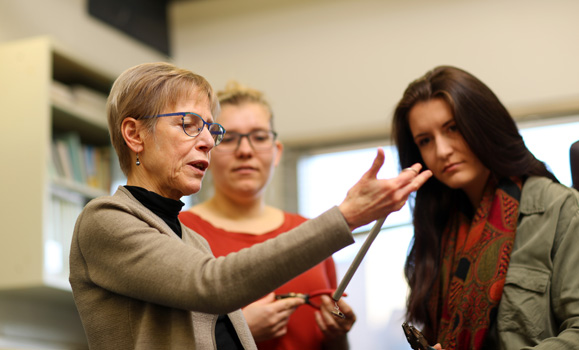This article is part of a series shining a spotlight on the personalities and priorities of Dal's senior leadership team. Revisit previous profiles at the Leadership and Vision website.
Marty Leonard remembers the day she first came to π˙√Ò≤ ∆± quite well. Walking across campus after her interview, she felt good; it was a perfect, blue-sky day. ‚ÄúAt my interview, I had a strong sense that this was where I wanted to be,‚Äù she recalls. ‚ÄúAnd now there was the glorious weather of the Maritimes.‚Äù
Dr. Leonard grew up in Cobourg, Ontario and remembers spending most of her childhood outdoors, “tromping through fields and mud, cycling to river valleys with friends, wading in streams, throwing rocks, climbing trees.” The relationship with nature wasn’t intentional; it was just play. But it seems to have made an impact.
Her undergraduate degree was in zoology at the University of Guelph, field-oriented, learning about birds, mammals, frogs and toads. Her master’s degree from Carleton University honed in on spotted bats in the Okanagan Valley in British Columbia. Finally, she studied the mating strategies of the marsh wren during a PhD at the University of Ottawa. “There I was, still in the mud.”
Her first job was with Agriculture and Agri-Food Canada (AAFC), where she worked on the welfare of chickens. “It was not what I had in mind as a young biologist,” she says. “I learned a ton, got a lot of out of it, but my heart was into something more academic. I wanted to be at a university.”
Then came her interview at Dal. She’s been here ever since, conducting research on the behaviour, ecology and conservation of birds. She was right about the job — it was exactly what she wanted. (That Maritime weather’s another matter.)
Becoming dean
In 2014, Dr. Leonard became π˙√Ò≤ ∆±‚Äôs Dean of Graduate Studies, where she focuses on giving the university‚Äôs 3,500 grad students ‚Äî across all faculties ‚Äî the best possible experience in academia and beyond. On a daily basis, that can mean anything from meeting with an admissions officer about a specific student, discussing concerns with a faculty member, helping a student solve a difficult problem, simply reassuring an upset student, or seeking funding for new initiatives to better support students. ¬Ý

Dr. Leonard in her lab with Hilary Mann (centre) and Anik Obomsawin.
‚ÄúMy vision is simply to support students and faculty,‚Äù she says. ‚ÄúWorking with grad students is my favourite thing. It‚Äôs what brought me to this office. I‚Äôve encountered all these bright, talented, fabulous people. I want to help them succeed.‚Äù ¬Ý
Dr. Leonard speaks excitedly about the Three Minute Thesis (3MT) event coming up on March 12 and 13, for example. “Every year the diversity and complexity of student research blows me away. I love seeing grad students in action.”
Dr. Leonard’s approach to her work, with faculty, staff and students, is to “lead from behind,” by which she means that when one is surrounded by talented people, as she is, leadership is

